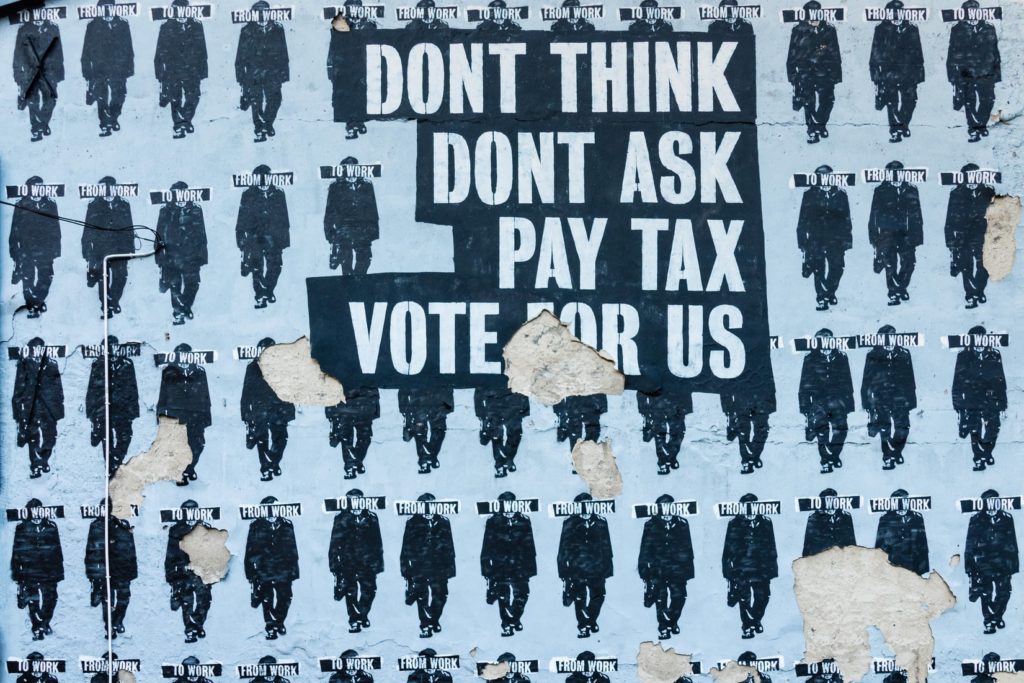The relationship between art and politics is multifaceted. Art can contribute to political discourse by supporting the current political and ideological views. However, more often than not, art is a disruptive form, that serves as a tool for changing existing political and social realities. Art can address certain political issues or reinterpret different social structures (for example, it can reveal different power balances in the society, offering alternative understandings of certain events, etc.)
Check our upcoming events selected for you:
Artists can be activists themselves, as a part of a political movement or organisation, but many times they cause political change singlehandedly without joining any pre-existing political force. In this blog post, we’ll look into the critical and emancipatory role art can have in society, as well as participatory art and propaganda art.
Making the Invisible Visible
Art is often used to draw awareness to certain underrepresented political issues. Street artist Banksy, for instance, is famous for his politically-charged art pieces, dealing with a variety of topics including war, migration etc. His activism reached its peak in 2015. First, he went to Gaza where he created several murals, to raise awareness about the decades-long Israeli-Palestinian conflict, followed by a series of artworks in the vicinity of Calais in France depicting the ongoing migrant crisis. These artworks hold a mirror up to society and provide a different perspective on certain political issues. It’s the art that asks questions about the world around us, rather than providing the answers.
Activist Art
But the role of art in today’s world doesn’t just end at highlighting the injustices that occur around us. Art can support, and even create certain political alternatives to the status quo. Take environmental art, for instance. Environmental artists greatly support the goals of the environmental movement, either by creating art from recycled and eco-friendly materials or by encouraging reduced jet travels, meat consumption, waste sorting, energy efficiency etc. They seek new ways to create art that warns people about the dangers of the environmental crisis, but also suggest solutions for mitigating and overcoming environmental issues.
Strengthening Communities with Participatory Art
Art can be used to organize people around a certain goal. Art can inspire and empower people to become change-makers in their surroundings. These socially engaged practices are usually participatory, gathering people from a certain area in a joint effort to make their neighbourhood a better place to live. One such participatory project, called Granby Four Streets, gathered a group of architects, and locals who worked together to renovate 10 houses and numerous empty shops. The project that transformed the local community had another important goal – increasing employment in an impoverished area, by providing people with building jobs and training. The art collective named Assemble won the Turner Prize in 2015 for this participatory art project that helps the community take control over their living space.
Memory Preservation
Everything we do today will eventually become history. And art can serve as a way of preserving important historical events. Take the collection of portraits in the Smithsonian National Portrait Gallery. Every year, the Smithsonian commissions portraits of a U.S. President and First Lady, that are kept permanently in the gallery’s collection. Apart from being magnificent art pieces in their own right, these portraits also serve as chronicles of American history.
The 2018 unveiling of Barack and Michelle Obama portraits was particularly significant, since for the first time in history both the sitters and the artists (Kehinde Wiley and Amy Sherald) were African Americans. Vibrant and glossy, these portraits serve as a powerful testimony of a long way African-Americans had to go through to become integrated into the country’s political institutions.
Art as Political Propaganda
Of course, not all political art is aimed at making the world a better place and changing the status quo. There are certain art pieces, deliberately created to support the current power structures in society. Sometimes artists are even commissioned to make pieces that support a certain political doctrine. This type of politically-charged art is usually called propaganda. It is used to distort reality through the dissemination of ideas that promote one cause and/or inflict damage to an opposite cause.
Propaganda art can take many forms such as paintings, sculptures, public art, etc. Political posters created during the Cold War are usually considered the purest form of propaganda in visual arts. Although usually tied to various autocratic regimes, it’s fair to say that every time period has its propagandistic art.
Politics and Art Today
Since politics and art are entangled in so many ways, it is almost impossible to cover all aspects in one post. That’s why, if you want to know more about how art can influence politics and vice versa, join our Politics in Contemporary Art talk on March 18 (@ 6:30 pm – 7:30 pm GMT). Our expert speaker will show you how artists from diverse backgrounds are using their creative practices to deal with current political and social problems.

